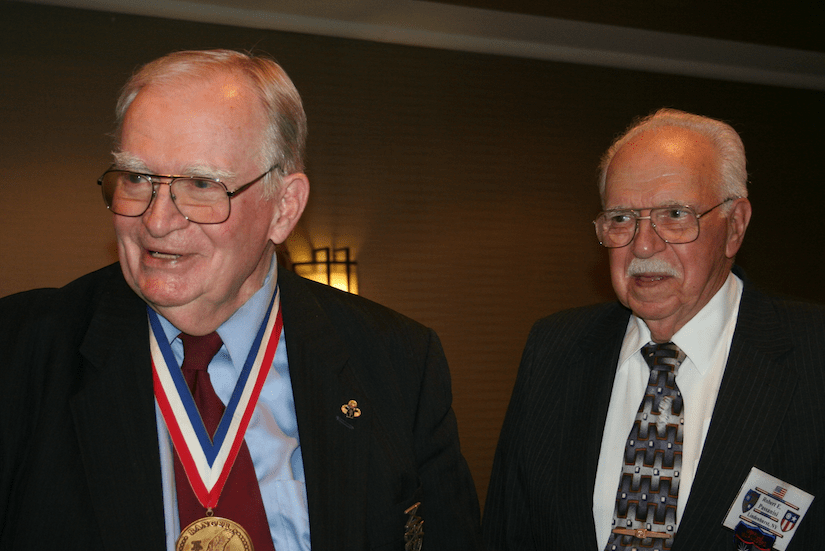Rice man part of Merrill’s Marauders
Published 11:17 am Thursday, October 27, 2016

- Ret. Lt. Gen. and Merrill’s Marauder Sam V. Wilson, 93, left, who died Saturday, is pictured with Merrill’s Marauder spokesman, historian and former editor of the “Burman News,” Bob Passanisi, 92, at a Marauder reunion several years ago when Wilson was the guest speaker.
By Jonnie Melillo Clasen
Special to The Farmville Herald
Sam V. Wilson, 93, of Rice, is one of a dwindling number of survivors of a 1944 secret mission involving almost 3,000 presidential volunteers who fought through the disease ridden “forgotten theater” of World War II, the China-Burma-India Theater.
Trending
What is remarkable is that those infantry jungle fighters, who have been called everything from “misfits” to “magnificent,” weren’t even expected to survive.

LT. DAVID LUBIN | SIGNAL CORPS
On March 18, 1944, men and animals from the 2nd Battalion cross the Tanai River on a bamboo bridge built by Kachin tribesmen, working with the Office of Strategic Services, near the village of Ning Awng.
“We were expendable,” Wilson said from his home.
The retired Army lieutenant general, who helped create Delta Force and still contributes to military and other publications, explained, “A plan existed on paper to get us into Burma, but no plan existed to get us out.”
Yet those extraordinary volunteers achieved their final objective May 17, 1944, of capturing north Burma’s only all-weather Myitkyina airstrip by defeating the much larger elite 18th Japanese Imperial Guards Division in five major battles and 30 minor engagements.
Wilson said that when the remaining elements of the unit were disbanded Aug. 10, 1944, in Burma, slightly more than 100 of the original Marauders remained.
Winston Churchill, British prime minister at the time, described Burma as “the most forbidding fighting country imaginable.” Gen. George C. Marshall, then Army chief of staff, said the Burma mission “was one of the most difficult of the war.” Marshall also said that mission against “large numbers of the enemy with few resources was unmatched in any theater.”
Trending
“It was hard to keep going as we wore down, became debilitated and our numbers began to decrease,” Wilson said. “These soldiers, not even expected to survive, did survive by forcing themselves to take the next step. They were infantrymen. They leaned forward and took one more step and then another. Taking that next step is what kept the outfit together to the bitter end.”
Those steps turned into an almost 1,000-mile history-making march up the enemy-held Himalayan foothills into the jungles of Burma. With only what they could carry on their backs or pack on mules, the Marauders walked farther than any other WWII fighting force. They were the first American ground troops to fight the Japanese in Asia.
Having three elderly Marauders from that “impossible mission” reach 101 years old and a fourth living to almost 101 is a testament to the Army’s 1943 stipulation that all the Marauders “will be of a high state of physical ruggedness.”

T/SGT DAVID RICHARDSON | YANK MAGAZINE
In February 1944, Col. Charles Hunter and Gen. Frank D. Merrill — for whom the unit is nicknamed — greet Lt. Col. William L. Osborne, Lt. Bright and the 1st Battalion after the long column of men and mules had climbed 6,200 feet to reach Pangsau Pass on the India-Burma border. China-bound aircraft could be seen flying hundreds of feet below.
The unit’s nickname, Merrill’s Marauders, honors its commander, Brig. Gen. Frank D. Merrill. The unit’s official designation was the 5307th Composite Unit Provisional.
“The Marauders weren’t ordinary men,“ said Wilson. “They were a tough, hard-nosed group of men with a sensitive chip on their shoulders. They had an almost disdain for danger.
“Their secret was learning to take the next step,“ he emphasized. “That’s all you have to do, except wipe your hands off from time to time so they won’t be too slippery to hold your gun. Today’s motivated and well-trained infantryman knows how to take that next step, which is a universal truth that has a timeless application to the infantry doughboy.
“Knowing we could always take one more step became a mantra — a theme — that has the same application to today’s Marauders. The tiny handful of aging Marauders are still making it one step at a time. Some have reached — and others are still reaching — for that magic number of 100 years old.”
Members of the 75th Ranger Regiment, whose crest is the Merrill’s Marauder patch, which has not ever been officially authorized, are carrying the legacy of this tough group of volunteers forward.
Records indicate that approximately 26 Merrill’s Marauders are still living out of almost 3,000 who volunteered in 1943 from the jungles of Panama and Trinidad, Guadalcanal, New Guinea, New Georgia, Vella Lavella and the United States. Approximately 15 ethnic groups, including a Native American code talker, served in the unit.
The oldest volunteer in 1943, who had about 20 years on the younger Marauders, was Joseph Doyer, a World War I veteran of the Canadian Black Watch Highlanders. One of the youngest was Bob Eatman, who enlisted in the Army at age 14, and was still too young to be served a celebratory drink after returning to the United States.
Wilson turned out to be one of the Army’s youngest lieutenants. At 16, he added two years to his age and walked seven miles through a nighttime thunderstorm to Farmville, where he enlisted in the National Guard.
Jonnie Melillo Clasen is the daughter of Merrill’s Marauder Vincent Melillo. A version of this article first appeared in the Ft. Benning Bayonet-Saber. It has been reprinted and edited for space and clarity with her permission.





